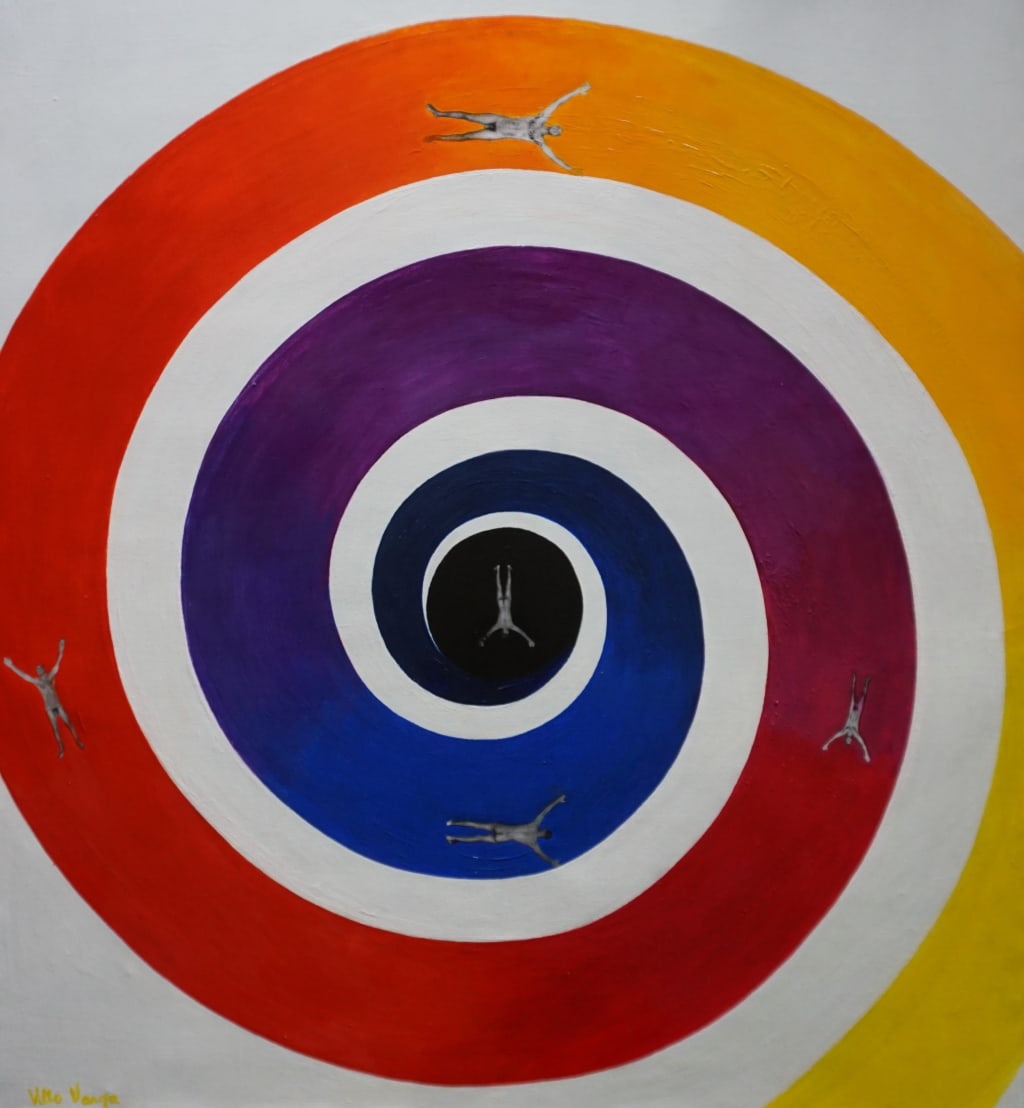On Another Side of the Sun
for the sf challenge

Nobody can hear a scream in the vacuum of space, or so they say.
In fact–nobody can hear anything, in the vacuum of space. It’s only by means of our bubble conduits, by which I mean our atmospheres, planetary or portable, in them and between them, that we can communicate over fragile lines.
My first space walk was ha more a space tumble. I screamed, and nobody heard, as my com was blocked. Then I righted myself, first body and then breath leveled out, and I beheld something of what the infinite heavens hold for us: stars and stars scattered like wildflowers, and beneath them an Earth still beautiful in many varied blues and browns, not ruined by us yet.
I fell, and fell in love with the universe.
From that newbie flirt on, I’ve been dallying with space. Moon rock quest: check. Mars visit (but mediocre, hardly beyond the domes): check. Skirting Saturn’s pebbly rings via tourist/extraction shuttle: dutiful check.
Daily I linger over the latest images from Triton, and beyond. More soberly I keep up with the latest findings in cryogenics, low-gravity adaptation, propulsion, and exoplanetary surveys.
I’m full-way into exploring space, yet only half-way into a gig that allows much direct access.
***
I can’t remember it, but my siblings and parents insist that as a small child I talked with flowers. (My impression is that it did not involve screaming.)
I do know that later in life I talked with plants, in complete earnestness and purpose. That’s because on my way to becoming an ecologist, I was a fully funded odd-edge experimenter in human-flora symbiosis, a calling that I pushed at with vigor, and which certain flush agencies had the margin to take an interest in.
Managing a healthy and diverse garden in the backyard or a greenhouse is a delightful hobby that would cost you some dollars, time and toil. Getting something similar viable in an exo-dome on Mars, however, is a matter of sheer survival.
Exo-ecology is both a tricky science, and something of a bogeyman in society. With all that’s gone wrong in the world–on Earth–some people think trying to expand out and away from it as deeply dubious. Not a few treat it as (to the species, to the planet) traitorous.
I view these efforts I am part of as necessary baby steps. To mix metaphors a bit: our arduous forays into space so far are but the primitive gestures of an infant species: we’ve barely stuck a toe out into the cosmic waters.
***
To awaken within a climate and light controlled metal cylinder embedded in an asteroid begs the question, what is morning, what is climate?
I feel more assured about the light. For there are points of it all about, even shades in the planetary array. We enjoy heavily shielded viewpoints, and of course monitors with camera feeds from the exterior. The show is enthralling. Central is old Sol, like a great Olympic torch planted to start our games, burning in the gravitational center, bold solar candle set against folds of abyss.
***
OK, really, it’s morning: in the sense that I’m starting my waking cycle, and am about to begin plying this body with dehydrated rations and black coffee. Our three other econauts are on a similar regimen, two staggered 12 hours ahead.
Wang compliments me on my professional efforts and complements them with her own. She is more microscopic. While I’m dealing with obvious hydroponics, measuring oxygen, CO2, and pollen harvest she delves into cellular and molecular aspects. Our other duo is similarly balanced, focused on radiation and outer structural issues.
We’re all about, all of us, seeing that life goes on.
***
Artificial life on an asteroid is so different from on Luna or Mars. Barren as they seem, there exist essential elements on those bodies. Even rocks and thin atmosphere, after extreme efforts, can birth water. No such a go on an asteroid. An asteroid equals sheer blank rock and metals.
Although propulsion and livability continue to improve, our off-world bubbles remain constrained by weakness in communication. Sound, light and radio waves but nudge atop the universal ocean. Sheesh, I’ve put so much time-space between myself and where I came from that I’m no longer at all sure what “home” is, was, or lies where. These bones and lungs are weakened, despite the supplements and exercise routines. I feel on the verge of becoming a space–rather than a human–being.
Perhaps the deepest effect of my off-world journeys, as they grow increasingly long, is on my dream-states. My dreams have turned fugues–polysensory feuds. Now, I’ve always dreamed in sharp colors, with realistic edges. But, for some time, slipping into and through and out of sleep, fantastic episodes occur, which seem to merge times locations gravities sensations intentions intuitions.
***
I suppose it should be expected, for anyone or anything that uproots itself entirely–whatever has been thoroughly uprooted from its origins.
We who venture out toward a radical Other surely will undergo changes.
***
Sleep periods, as with most wake periods, can be very mundane. I’m used to odd dreams. It’s the odd waking times that throw me.
Same as on old Earth.
***
A unique thing transpired “today.” Wang and I were servicing the hydroplanters and while measuring what thrived and what vainly strived, attending to the usual procedures, an anomaly manifested itself.
We registered a very surprising pattern in the growth of many plants. Their stems seemed budding in unusual convolutions. Vines had begun to twist and sprout, in unexpected formations.
Wang was instantly, cautiously, fascinated. Both of us had seen many apparent anomalies pan out ultimately to nothing: same old same old.
Then she went through the whole rigmarole of sampling, dissecting, testing, viewing. And was puzzled by the results.
***
The plants have changed.
They shape themselves into geometries: arabesques, crystal-forms, matrices. It is apparent to all, not in our delusion. The mirror team, Rogers and Moreno–hard engineers and geologists, both–have observed this equally.
Wang says that major unknown mutations are occurring in all the vegetation at the most basic level. Rogers and Moreno at the same juncture claim a shift in the density of the asteroid core.
I see, smell, touch pungent green patterns (with some red) evolving.
***
I was asleep against a hillside of dense flowers.
In a forced, not a happy, sleep.
Now I awaken.
***
Multiple plants have ballooned, are engorged and intertwined. Their buds and flowers have taken on rainbow radiances. I don’t know any artist or poet who could capture it.
The plants have turned as though into an organized organic maze. Still pliant to the touch, yet now they have become immune to our human digging, clipping! All of our interventions.
***
The stars lie out there still, wildflowers in endless fields.
Green things here in the dome are ever more like the exploding stars.
These blooms don’t listen to me, won’t speak with me.
Question: what will they beget in time? Merely more stems and leaves, more mindless growth? Will they produce planets and moons, create other forms, as they expand into our explosive universe?
***
In their metal and acrylic pods Wong, Rogers and Moreno have gone into endless sleep. Maybe their dreams will reach mine, which come to me even in insomniac depths.
I will scream–believing no one will hear.
About the Creator
Mark Francis
Published translator of verse and original writer of haiku, senryu, lyric, occasional and genre poetry and speculative fiction.
Reader insights
Outstanding
Excellent work. Looking forward to reading more!
Top insights
Compelling and original writing
Creative use of language & vocab
Excellent storytelling
Original narrative & well developed characters






Comments
There are no comments for this story
Be the first to respond and start the conversation.